87 years of watching women’s way of lives in a flower town,Gion
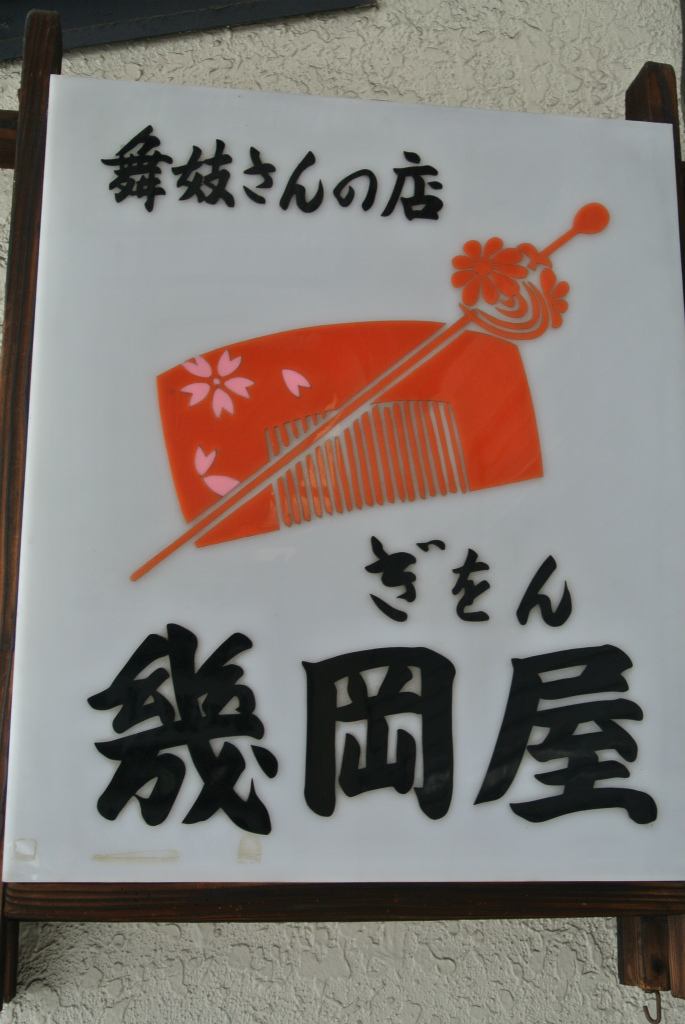
If you walk toward Yasaka-jinja Shrine on Shijo-dori Street, what you’ll find on the right is this signboard
“I was born in 1925, you know. This is the first year in the Showa period. So, I was one year old in the year, two in the second year…it is so easy for me to count my own age. If it was still in the same period, I am 87 years old in the 87th year!”
The man who talk with a dynamic laughter is Mr. Kojiro Sakai, known as a ‘living dictionary’ among people involved with flower towns in Kyoto.
There are kanzashi (ornamental hairpins), combs, obijime (a sash belt used to hold a obi belt in place),obidome (sash clip),fans, ozashiki-kago ( bags for ozashiki), netsuke (hanging accessory for small belongings) ,hanameishi (business card for maiko and geiko)…
Ikuokaya is an old-established store completed with all the goods and ornaments for maiko’s attire.
The haberdasher was first established in 1862. One letter in store’s name ‘Iku’ was given by ex-geiko (mature geisha) named Ikumatsu who is famous for her love affair with Takayoshi Kido (renowned samurai and politician. known as one of ‘the three contributors to the Meiji Restoration’).
The second owner of store had a close relation ship with him. And the third owner was Oren san who made her name for her beauty in times when people like Mikihiko Nagata and Isamu Yoshii played around in town. Mr.Sakai’s father inherited a store as the fourth owner, and in 1933, he passed a baton to his 33 years old son, Mr.Sakai.
※Mikihiko Nagata is a writer who wrote lyrics for ‘Gion Kouta.’ Isamu Yoshii was a poet and screenwriter lived in the Taisho-Showa period
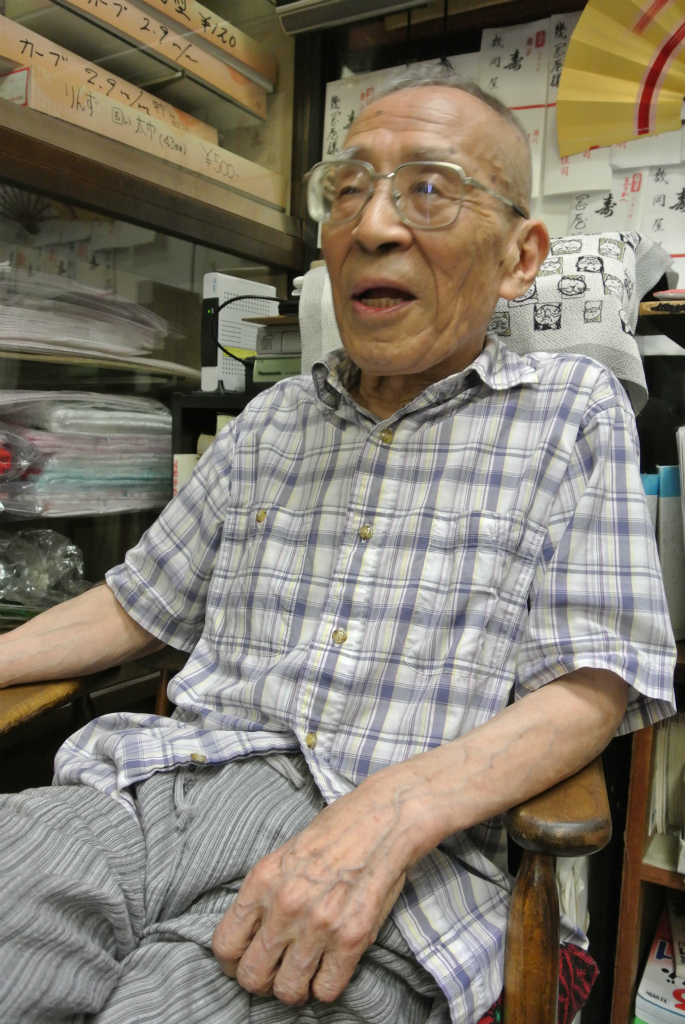
The fifth owner, Mr. Kojiro Sakai. His father used to drop by ochaya owned by Ms. Sata Matsumono who was a geiko with intelligence and beauty. Flower town was the great love of his life.
“Her name is Danei san. We are the same age. She is jikata (an accompanist for maiko’s performance) on active service!”Mr.Sakai pointed a photo of geiko (mature geiko) in a catalog for the Miyako Odori( the Miyako Festival),2012.
He squinted a little and turned over the pages. There are portraits of geiko and maiko who performed for the festival this year.
“Today, number of maiko is decreased so much, you know. After the War, there were 120 maikos at the most. I mean maikos just in Gion-Kobu, this is not a total number of them in five flower towns. In prewar days, there were 200 maikos in town, I think. With geiko, it must be about 800 in total. By the way, if you ask this woman to make a wig, she was super duper.”
What he showed me was an art book called‘The Doll’s Coiffure’ (The Ningyo Yuigami) by a doll maker, Ms.Nami Yamada.
It is a photo book with artistic coiffures made by her hands. They are all based on hairstyles for geiko and maiko in flower towns where she worked as a geiko.
After quitting, she shifted to a doll maker and lived in Kyoto for a long time till retirement. I hear that it was the last time for Mr.Sakai to see her when they did a farewell party for her in town.
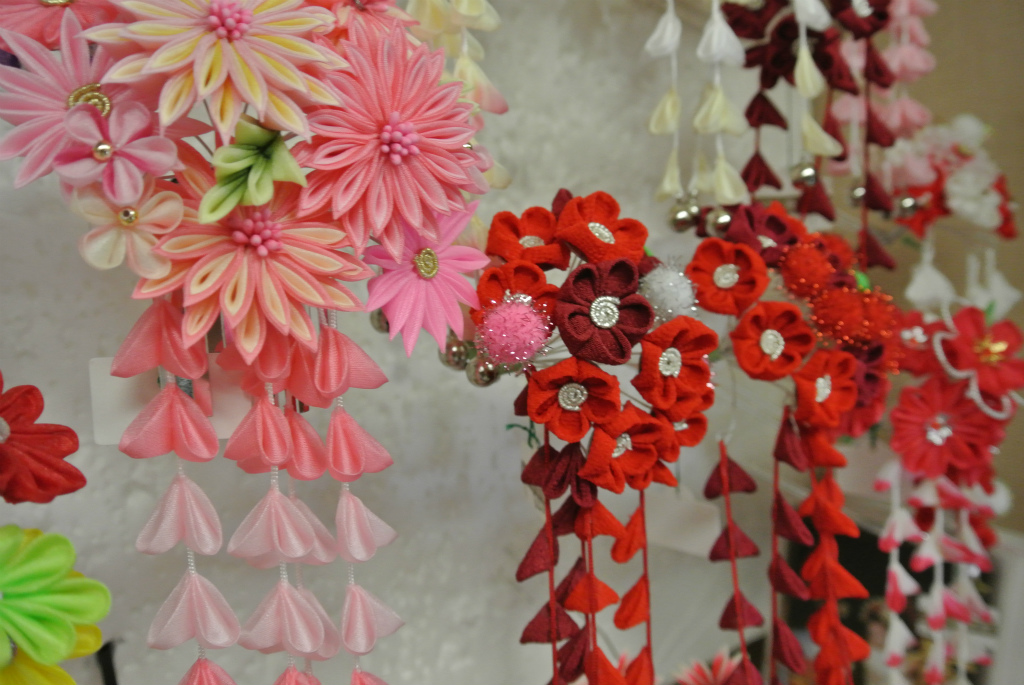
All fabric parts of kanzashi are made in silk. From dyeing to sewing, everything is made by artisan’s hands
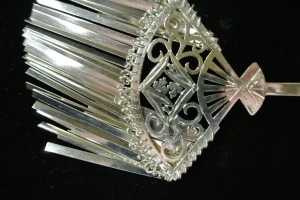
This full-silver kanzashi is called ‘birakan’. Geiko do not use this type of ornaments
“For her entire life, Ms.Yamada married no man. She had no kith or kin as well, so her pupils went to some museum and donated her coiffure collections. It was about long time ago. If she were still alive, she would be 110 years olds or so…”
I felt a little pain in my chest because there was a nostalgic gentleness in a tone of his voice. Faded colors in a photo book seemed to have informed the days in past for sure. To me, it felt as if a weight of one volume shows you her devoted way of living.
As a woman like Ms.Yamada, here is what I think. To make a career out of being a geiko, to live single afterwards and to have the strength to go on living her whole life. It must have been so hard to achieve them at that period.
Today there are increased numbers of independent women who do not choose to get married, but the situation is too different between now and the past. If you wish, you can improve your lot by own efforts in various ways. It is all up to you if you choose or not. It may be a great supposition because I have not met Ms.Yamada before in my life. But I truly think the way of life like hers could have achieved only by the one who has both strong heart and supple mind.
My classmates are maikos and sons of ochaya… ~the precious boyhood~
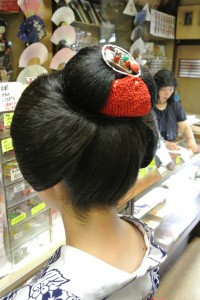
“Hello,Otosan!”-Maiko, Kanoemi san of Gionhigashi greeted to Mr.Sakai as soon as she found him sitting in a back corner of store
Born and brought up in Gion. Mr.Sakai is a pure man of Gion. Since childhood, he has seen its beauty, felt its elegance and lived with its changes for many years.
“When I was about 8 or 9 years old, there were ochayas and soaplands mixed in areas like Higashi-shinchi and Miyagawa-cho. There were many public baths for women as well. One day, a friend of mine asked to me to visit his house at night. He lived in the area, you know. We went upstairs, but of course it was dark all over.”
“He said,‘Hey, check out there,”I looked down at a place where lights were on. Then I saw many naked women through the window opened. He was excited but I was like ‘O.K, I can clearly see them.’” There was a mischievous shadow of boyhood in Mr.Sakai’s face.
At elementary school he went, there were many children who are related with flower towns including daughters and sons of ochayas. Today, maiko applicants are not allowed to enter the towns until they graduate from junior high schools.
Rules are all the same for every flower town, and average age for maiko is between 15-20 years old at present. But when Mr.Sakai was a kid, I hear that it was quite normal for girls to debut as a professional maiko at the age of 11-12.
Girls’ students who are to be future maikos only take lessons in the morning, and left school for maiko training at the Yasaka Nyokoba School in the afternoon. (school where girls learn to practice performing arts)
Though they grew up together as fellows in a same town as classmates, I imagine it must be so exciting for boys to have the future maiko next to them. Some might see them as someone special living in another world, but I am pretty sure some got stirred their curiosity.
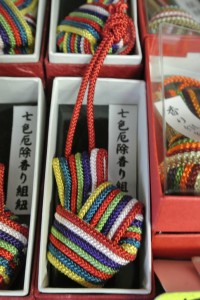
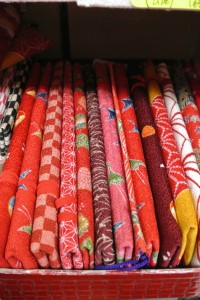
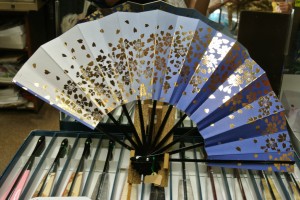

It feels like being in a Color Museum. You can feel the precious art of craftsmen everywhere in shop
Mr.Sakai in those days used to go out to a ‘playground’ with sons of ochayas and other merchants. There were many places where minor children could hang out till late at night.
It was around Kiya-cho -Kawaramachi,Kyogoku -Shinkyogoku areas. “Of course, it was legal for us to go there. We played Corinth Game, Smart Ball, ate Udon noodles…”
“Their parents give so much pocket money to them and say, ‘You go out and play, O.K?”And they come to ask me out. So they buy me everything! Because their parents carry on business, I mean ochayas mainly. Houses are located just next to them. It is no good for boys to hang around there…”
As a matter of course, daughters are the ones who are meant to be maiko and geiko in future. And the ones who inherit ochaya would be daughters or someone female. Yes, it is a woman’s world. For boys born in ochaya family are destined to have such a rough time. I could not help feeling sorry for them from my heart.
All children must be hugely pleased when they are given some money and told to go out and play as much as they want. But son’s cases were different. Especially when they reach at certain ages, they needed to find a place apart from home.
Even though there is nothing for them to feel guilty about, it was no good for them to be there around ochayas because they are men. Customers might think and say“Isn’t he in love with that maiko?”Rumors are just rumors, but it seriously affects their business.
So, sons of ochayas had to leave their home. At the latest they said goodbye to original family when they were 14. Some were adopted into different family just before they enter junior high school while the others moved to distant towns or cities to live with relatives.
“We rarely met afterwards,”Mr.Sakai said. Custom of flower towns, circumstances of family… they are something they cannot avoid though, memories of them still live brightly in his heart. They left town not because they wanted to do so. They could not help leaving. If they looked back in old times, I suppose that it must be more like a fleeting illusion than a bittersweet memory. Reality bites in all ages…
“The world of elegance”that he continued to protect affectionately
“I think I have survived quite well in my life,” Mr.Sakai says with a calm smile. At that moment, I felt something approaching from behind and turned around. It was a waitress on delivery.
She put a glass of ice coffee for me.“Don’t you drink one, Mr.Sakai?”I asked,“I’m O.K. Please, please drink yours”after he replied, moved his head very slowly, from right to left. For a second, I wondered why he acted like that and realized what it was about. What a great man he is. He was looking around his store!
The special seat of his on corner commands a panoramic view of the store. I was sitting face to face to him across the table, so I turned around. The store was almost overflowing with weekend customers. And we began talking again. Now it was about episodes during the war.
“It was a forced labor at that time. If you were healthy young man, you had to go to student mobilization. I joined the military in Matsudo. After that I went to Kashiwa,too. Though it was only for 8 months or so, I cannot forget the strong time…”
It was year 1944 when Mr.Sakai did military service. He was a second year student at Doshisha-Kosho (current Faculty of Commerce at Doshisha University). In the following May, he hurried to Tokyo hit by Great Tokyo Air Raids. There were rescue works for the sufferers and a removal of ashes in the Imperial Palace to be done.
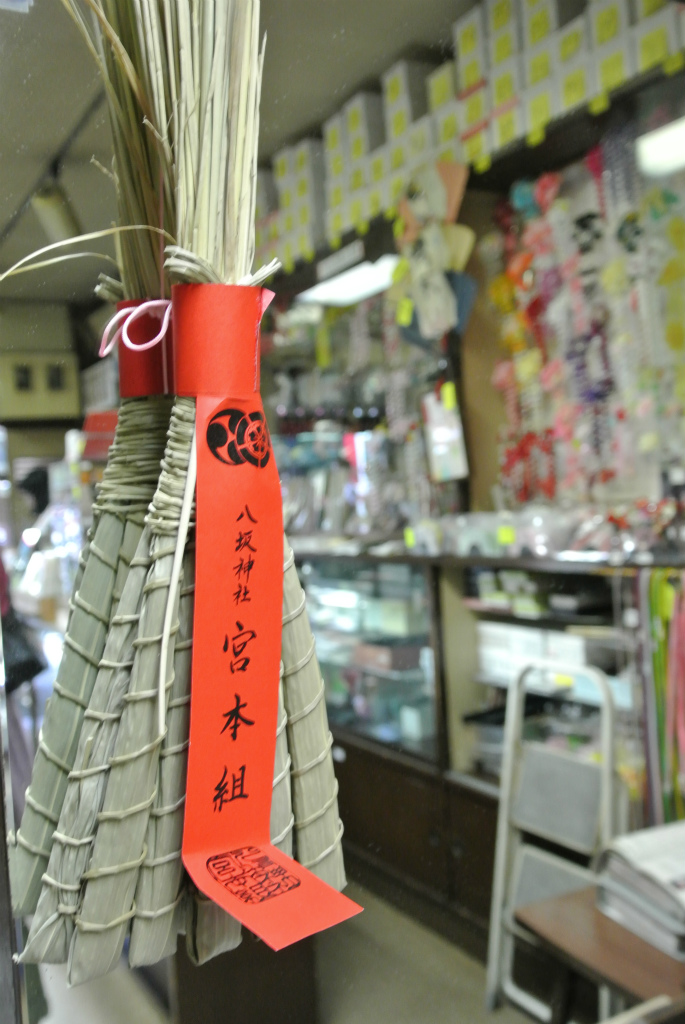
Soon after the war ended, He got on an overcrowded open freight car to get back in Gion, but there were no one in a house waiting for him. I hear that it was collapsed so bad inside, it was littered with everything that used to be there.
Later he could meet his parents without mishap, and sad to say, his sister married in Osaka passed away due to the aerial attack. “ The townscape was completely changed. I couldn’t believe it was Gion. All houses and ochayas turned into vacant lots, roads were wider…There was no clue to figure out what is where. My parents told me later that our house was supposed to be torn down. Luckily, it was cancelled as the war ended. But restoration was so fast in flower towns.”
Mr.Sakai says that flower town of Gion already started to attract some customers in 1946. However on the other side, there were so-called ‘zegen’ who sell young women to brothels. It is said that women’s destiny was judged by these men without choice.
“It is not a very good thing to say, but if she was beautiful, she must have sent to certain places to get trained as maiko, I suppose. It is harsh… you can’t believe zegen exist today, but it was acknowledged in public.”
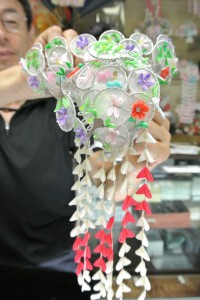
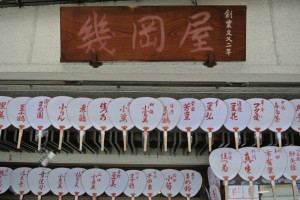
Plum blossoms, cherry blossoms, wisteria, bellflower… for maiko’s kanzashi seasonal flowers are often used for its designs, but ‘uchiwa’ (round fan) is also one of the representative motif for summer
Then, six years later, Mr.Sakai married his wife when he was 27 years old. They have run Ikuokaya together, supported each other in both public and private until today.
Besides flower towns in Kyoto, there are Aizuwakamatsu, Shinbashi,Mukoushima,Asakusa and other hot-spring resort towns where geiko (mature geisha)live and work-The store have customers all over Japan.
It is not only stuffs for maiko and geiko, they have wide range of products for the general public, too. Hair ornaments, mirrors, round fans for summer, furoshiki (Japanese wrapping cloth)…Even cases for electronic dictionary and original ‘abura-torigami’(oil-absorbent paper used as cosmetics) are on a line-up.
After the interview, I went to take photographs of a shop from outside. People come and go on Shijo-dori Street constantly. It is simply overwhelming to see uchiwas (round fans) lined up in front of it. People keep on coming in as if they are attracted by the display.
Once you go through entrance, there is ‘the world of elegance’ where fine products of various colors welcome you. If I were to nickname Mr.Sakai who have laughed, cried and lived strongly with 150 years-old shop, ‘guardian deity with impish smile’ could be the perfect one.
Photos:Copyright(c)2012 Geisha Japan All Rights Reserved


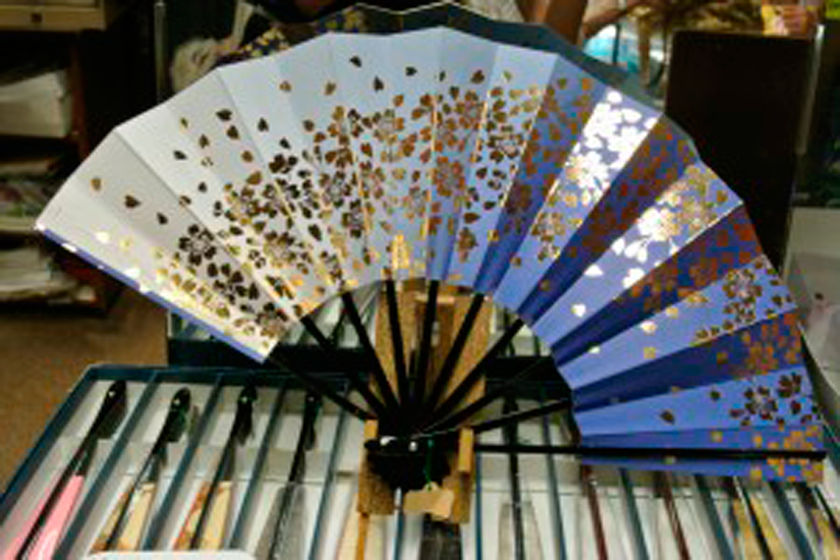
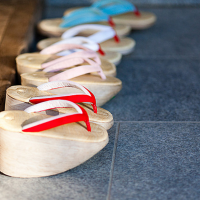
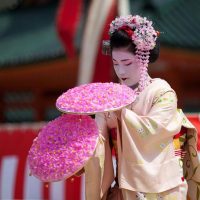
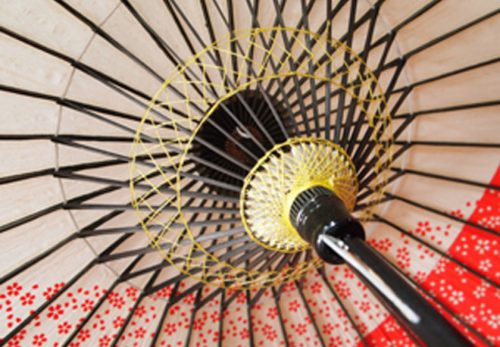
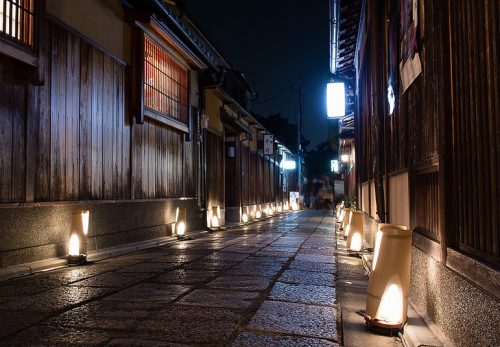
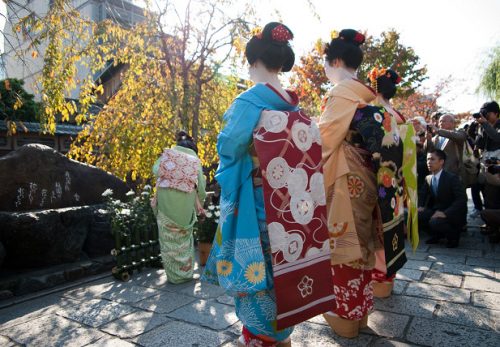
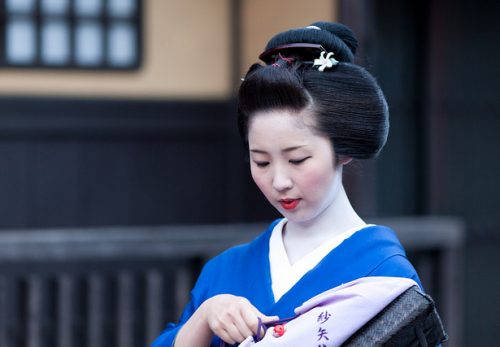
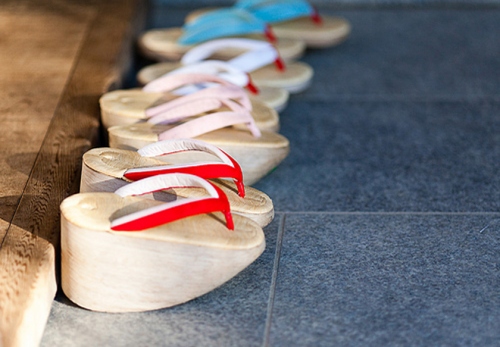
この記事へのコメントはありません。